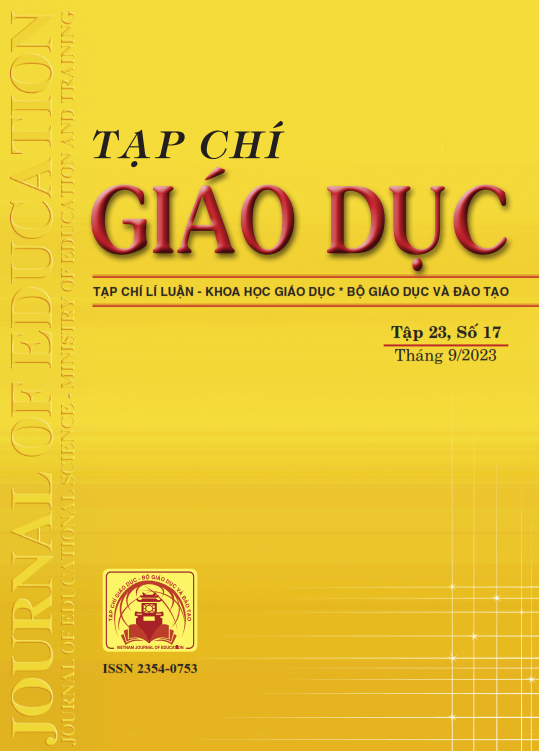Những yếu tố ảnh hưởng đến sự sẵn sàng của sinh viên với việc học trực tuyến: nghiên cứu tại Trường Đại học Ngoại ngữ - Đại học Quốc gia Hà Nội
Tóm tắt
In recent years, online learning has become a trend all over the world as well as in Vietnam. However, an urgent issue needs to be raised, which is the effectiveness of online learning and ways to ensure the quality of online teaching and learning. To learn about the effectiveness of online learning activities, research was conducted to determine the factors affecting the readiness of students at the University of Foreign Languages - Vietnam National University, Hanoi for online learning. The results show that students' readiness for online learning is influenced by three factors. While online learning and information technology skills have a positive effect, time management skills exert a negative impact on online learning.
Tài liệu tham khảo
Anderson, J. C., & Gerbing, D. W. (1988). Structural equation modeling in practice: A review and recommended two-step approach. Psychological Bulletin, 103(3), 411-423. https://doi.org/10.1037/0033-2909.103.3.411
Blayone, T. J. B., Mykhailenko, O., Kavtaradze, M., Kokhan, M., vanOostveen, R., & Barber, W. (2018). Profiling the digital readiness of higher education students for transformative online learning in the post-soviet nations of Georgia and Ukraine. International Journal of Educational Technology in Higher Education, 15(1). https://doi.org/10.1186/s41239-018-0119-9
Cigdem, H., & Ozturk, M. (2016). Critical components of online learning readiness and their relationships with learner achievement. Turkish Online Journal of Distance Education, 17(2), 98-109.
Davis, F. D., Bagozzi, R. P., & Warshaw, P. R. (1989). User acceptance of computer technology: A comparison of two theoretical models. Management Science, 35(8), 982-1003.
Hair, J., Anderson, R., Tatham, R., & Black, W. (1998). Multivariate data analysis (5th Edition). Prentice Hall, New Jersey.
Im, I., Hong, S., & Kang, M. S. (2011). An international comparison of technology adoption Testing the UTAUT model. Information & Management, 48, 1-8.
Martin, F., Stamper, B., & Flowers, C. (2020). Examining student perception of their readiness for online learning: Importance and confidence. Online Learning, 24(2), 38-58. https://doi.org/10.24059/olj.v24i2.2053
Mattice, N. J., & Dixon, P. (1999). Student preparedness for distance education (ED 436 216). College of the Canyons.
Morse, J. M. (1991). Approaches to Qualitative & Quantitative Methodological Triangulation. Nursing Research, 40, 120-123. https://doi.org/10.1097/00006199-199103000-00014
Ngampornchai, A. & Adams, J. (2016). Students’ acceptance and readiness for E-learning in Northeastern Thailand. International Journal of Education Technology in Higher Education, 13. https://doi.org/10.1186/s41239-016-0034-x
Nguyen, H. T., & Chu, Q. P. (2021). Estimating University Students’ Acceptance of Technological Tools for Studying English through the UTAUT Model. International Journal of TESOL & Education, 1(3), 209-234. http://eoi.citefactor.org/10.11250/ijte.01.03.012
Nguyễn Nam Phương, Nguyễn Văn Tú (2023). Sự sẵn sàng tham gia các khóa học trực tuyến của sinh viên: nghiên cứu trường hợp tại Trường Đại học Sư phạm Hà Nội. Tạp chí Giáo dục, 23(01), 59-64.
Nunnally, J. C. (1978). Psychometric Theory (2nd ed.). New York: McGraw-Hill.
Park, S. Y. (2009). An analysis of the Technology Acceptance Model in understanding university students’ behavioral intention to use E-learning. Educational Technology & Society, 12(3), 150-162.
Peterson, R. A. (1994). A Meta-Analysis of Cronbach's Coefficient Alpha. Journal of Consumer Research, 21, 381-391.
Venkatesh, V., Morris, M. G., Davis, G. B., & Davis, F. D. (2003). User acceptance of information technology: Toward a unified view. MIS Quarterly, 27, 425-478.
Wei, H. C., & Chou, C. (2020). Online learning performance and satisfaction: do perceptions and readiness matter? Distance Education, 41(1), 48-69. https://doi.org/10.1080/01587919.2020.1724768
Yu, T., & Richardson, J. C. (2015) An Exploratory Factor Analysis and Reliability Analysis of the Student Online Learning Readiness (SOLR) Instrument. Online Learning, 19, 120-141. https://doi.org/10.24059/olj.v19i5.593
Zimmerman, W., & Kulikowich, J. (2016). Online Learning Self-Efficacy in Students With and Without Online Learning Experience. American Journal of Distance Education, 30, 180-191, https://doi.org/10.1080/08923647.2016.1193801
Tải xuống
Đã Xuất bản
Cách trích dẫn
Số
Chuyên mục
Giấy phép

Tác phẩm này được cấp phép theo Ghi nhận tác giả của Creative Commons Giấy phép quốc tế 4.0 .












